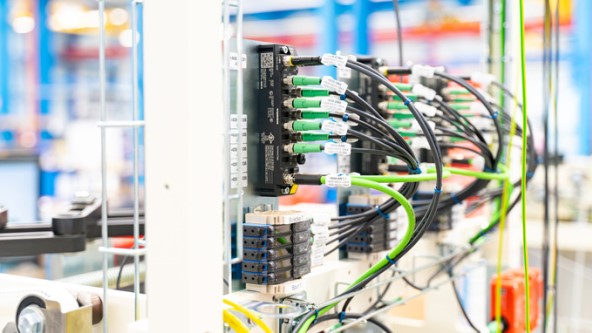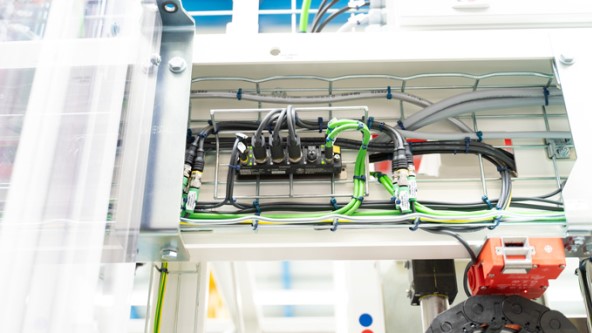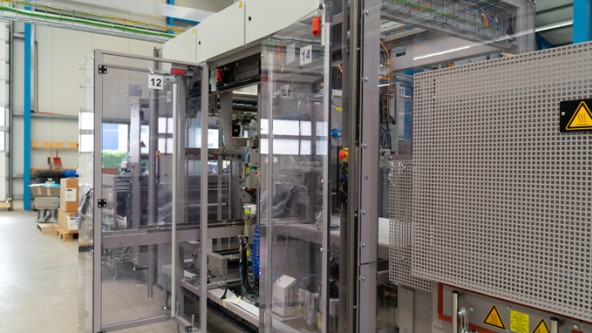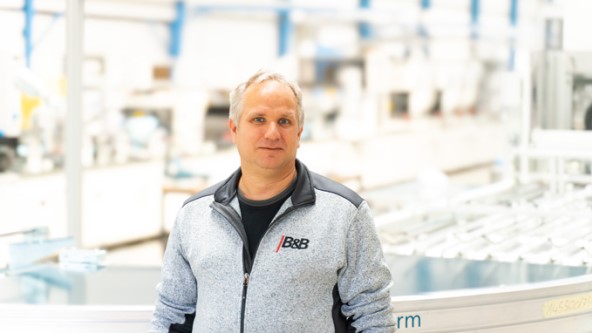I/O Technology for Flexible Machine Concepts
B&B Verpackungstechnik relies on modular machine concepts with decentralized I/O technology from TURCK – for greater efficiency, flexibility, and digitalization
B&B Verpackungstechnik GmbH in Hopsten develops bagging and end-of-line packaging machines and relies on a modular machine concept with decentralized I/O and safety technology from TURCK. By using robust IP67 modules directly on the machine, the company significantly reduces wiring costs and speeds up setup, commissioning and service. The new architecture creates the basis for end-to-end digitalization – including remote maintenance, scalability and efficient service worldwide.
Tradition meets innovation: B&B Verpackungstechnik GmbH in Hopsten manufactures highly specialized bagging and end-of-line packaging machines – tailor-made for customers worldwide. The owner-managed company stands for quality, flexibility, and creative engineering. But even in an environment based on decades of experience, technical change is indispensable.
Decentralized I/O modules as the key to modularization
Together with his team, Emsmann developed the new machine concept. Instead of central terminal boxes, decentralized I/O modules were to be installed directly in the machine environment. In its search for a future-proof automation solution, B&B initially remained manufacturer-neutral. Emsmann and his team specifically looked for I/O modules that capture signals directly in the field. They chose TURCK's robust IP67 TBEN-L and TBEN-S block modules, partly because of their Ethernet multiprotocol capability, as they support both Profinet and Ethernet/IP.
Ultimately, TURCK also impressed in terms of functional safety: the TBPN hybrid safety modules enable the flexible integration of safety-related Profisafe and classic Profinet signals on a single module – including IO-Link. "I approached the selection process independently of any particular manufacturer – and ended up with TURCK," explains Emsmann.
Up to 240 electrician hours saved per machine
The changeover was a major undertaking. But it was worth it: cable lengths were drastically reduced, troubleshooting was simplified – and, according to Emsmann, B&B now saves up to 240 electrician hours per machine.
The new architecture not only facilitates assembly but also transport and commissioning. In Hopsten, the machines are completely assembled, tested, and then disassembled into modules suitable for transport. On site, they can be quickly reassembled thanks to pluggable connections – without time-consuming rewiring. Technicians also benefit in the event of servicing: modules can be easily replaced without having to delve deep into the electrical system.
Flexibility through IO-Link and multiprotocol
Although every machine at B&B is custom-built, the company relies on consistent standardization. Macro projects in Eplan, modular assemblies, and uniform I/O modules help to manage complexity. Even with different control systems, the field cabling remains largely identical—an advantage for design, purchasing, and service.
Partnership on equal terms
Close coordination with TURCK was crucial during the modularization process – especially when integrating the safety modules and communicating with different control systems. "There were many small things that had to be coordinated between the software and hardware at the beginning. But once contact between the experts was established, things moved quickly," summarizes Emsmann. He is satisfied with the support:
What began with a packaging machine is now being extended to other machine types. Bagging machines and combination systems are also set to benefit from the decentralized architecture in the future. The experience gained from the pilot project is being directly incorporated into further development. The company is already testing new modules and technologies – for example, for decentralized protection or for controlling adjustment motors. Condition monitoring and energy monitoring are also planned. The goal is a fully digitized, flexible, and maintenance-friendly machine platform.
Further Information
- Link to the Products: IP67 TBEN-L
- Link to the Products: TBEN-S
- At a Glance: RFID Systems for Secure Processes in Production and Logistics
- At a Glance: Safe Use of Ethernet in Ex Areas
- Technology Page: RFID Solutions
- Technology Page: Ethernet in Hazardous Locations
- Download Whole Article – more22552e [PDF, 1,39 MB]
- Automotive
- Modular Flexibility and Safety in Filter Production
- Smart Cable Prevents Machine Downtimes
- Inductive Couplers Ensure Precise Material Feed
- Assembly Management with a Direct MES Connection
- Car Body Identification in Automobile Production
- Reliable Skid Detection in Automotive Production
- Error-free JIS Order Picking for Bumpers
- Laser Sensor Detects Shiny Cylinders in Battery Production
- RFID Bus Mode Ensures Quality of Lithium-Ion Batteries
- Level Measurement in Dip Coating Line
- Level Control in Central Lubrication System
- Quality Assurance on the Gluing Robot
- Tilt angle sensor accelerates platform alignment
- Motor Control with Condition Monitoring
- IP67 Hybrid Module Processes Safety Signals
- Decentralized monitoring of cooling stations
- Robot welding cells networked with Ethernet
- Monitoring the cooling circuit on welding clamps
- Flow monitoring in drum washers
- Press Shop – Sheet Metal Thickness Measurement
- Condition Monitoring of Motors as a Retrofit
- Cloud-based Level Monitoring
- Press Shop – Tool Identification
- Body Shop – Welding Nut Detection
- Paint Shop – Skid Identification
- Final Assembly – Robot Assembly
- Powertrain – Contactless Verification
- Body Shop – Area Guarding
- Item-level Detection with UHF RFID
- Supply of cooling lubricant in machine tools
- Press Shop: Controlling hydraulic pressure
- Measuring process pressure on scissor lifts
- Body Shop – Automotive Welding Tip Inspection
- Body Shop – Manual Load Weld Cell
- Final Assembly – Black Parts Detection
- Final Assembly – Moonroof Detection
- Final Assembly – Long-Range Inspection
- Powertrain – Rubber Washer Detection
- Powertrain – Part-In-Place Detection
- Electric Vehicle Detection
- Vehicle Detection in a Self-Serve Car Wash
- Success Stories
- RFID Solution for Data Acquisition in Stator Production
- Automation and Control of Hydrogen Filling Stations
- Modular Plant for Flexible and Efficient Production
- Laser Sensor Detects Black Bumpers in Assembly Cell
- Decentralized Safety Technology for Modular Production
- Modular Conveyor System
- RFID and I/O modules for Safe Tool Changes
- RFID Guides AGV in Suspension Production
- IO-Link Wired Silencer Production
- Workpiece Carrier Identification in Rear Vent Production
- Weld Nut Sensing
- RFID Traceability
- RFID in Engine Production
- Bumper Production with Identification
- Solutions for Paint Shops
- Welding and Assembly Sensors
- Angle Sensors for Assembly Systems
- Tool Identification
- Pick-to-Light Improves Cockpit Production
- RFID Identification of Injector Nozzles
- RFID in the Body Shop
- IO-Link Eases Differential Gear Production
- Chemical
- excom I/O System Enables Safe Hydrogen Liquefaction
- Decentralized Automation in Ex Areas
- RFID Control of Tube Connections in the Ex Area
- Ethernet Signal Connection in the I&C Room
- Ethernet-based Automation of Modular Skids
- Ex Isolation in Modular Process Plants
- Detection of Pigs
- Remote Signal I/O
- Easy Connection of Field Devices
- Signal Processing with System I/O in the Control Cabinet
- Signal Separation with Interface Technology in the Control Cabinet
- Identification of Hose Connections
- Efficient Monitoring of Cabinets in the Field
- Monitoring of Quarter Turn Actuators
- Planning and Assembly of System Solutions
- Success Stories
- Control Cabinet Monitor for Transmission of Condition Data
- Record Silo Fill Levels in Real Time Thanks to Sensor-to-Cloud
- Efficient Cooling of Industrial Furnaces
- I/O System Excom Creates Space in the I&C Rooms
- Zone 2 and 22 RFID
- Efficient Testing Control
- Intrinsically Safe Field Communication
- Process Control System Partnership
- Hazardous Area Remote I/O
- Dual Valve Position Feedback
- Flexibility with Fieldbus
- Asset Management with Remote I/O
- Correct Positioning with RFID in Carbide Production
- Compact Ex Protection
- Energy
- Capacitive Sensor Detects Point Level in Pellet Heating System
- RFID System Identifies Solar Cell Carriers
- Decentralized I/O System for Hazardous Areas at H2 Refueling Stations
- Decentralized I/O Solution in Ex Zone for H2-Fueling Station
- I/O Module Facilitates Setup and Mobile Use of Fuel Cell Test Stand
- Wind Turbine Rotor Positioning
- IP67 I/O in Coal Production
- UHF RFID Identifies Switch Gear
- Remote I/O in Biogas Plant
- Food and Beverage
- RFID Tracking Reduces Food Waste in Ice Cream Production
- Condition Monitoring Sensor Automates Climate Control
- Condition Monitoring of Control Cabinets
- Condition Monitoring in Storage Rooms
- Dough Thickness Control in Rolling Machines
- Identification of Food Containers
- Container Check
- Quick Sensor Replacement in Beverage Plants
- Detection of Pipe Elbows
- Identification of Chocolate Moulds
- Success Stories
- Cloud-based Maintenance for Steam Generators
- RFID Support Enables Track and Trace in Food Production
- Reliable Linear Position Detection in Ex Zone 22
- Decentralized Control Modules in Coldstore
- Track and Trace in Meat Production with RFID
- Contact-free Encoder in Potato Production
- UHF RFID in Food Distribution Center
- RFID for Chocolate Production
- Distributed I/O for Food Equipment
- Remote I/O for Distilleries
- RFID and Autoclaves
- IP67 Power Supplies for Conveyors
- Bottle Detection with Camera
- Logistics
- UHF RFID Tunnel for Goods Identification on Conveyor Belts
- Preventing Package Jams in the Logistics Center
- Height Control and 3D Spatial Monitoring on Autonomous Forklift Trucks
- Decentralized Control of Conveyor Modules
- Tracking Big Bags with RFID
- Distance Detection in Container Cranes
- Access Control for Protected Areas
- Decentralized Muting of Electro-sensitive Protective Equipment
- I/O Blocks Control Roller Conveyor Modules
- Container Check
- Fast Tag Detection at Warehouse Gates
- Item-level Detection with UHF RFID
- Preventive Maintenance on Conveyor Belts
- Detection of Transport Containers
- Level Detection in Vessels
- Identification of Cryovessels
- Identification of Mobile Containers with Handheld Devices
- Identification of Food Containers
- Tier 1 – Bumper Identification
- Condition Monitoring in Storage Rooms
- Collision Protection on Reach Stackers
- Success Stories
- Efficient Order Picking with Pick-to-Light System
- Efficient Solution for the Digitalization of Conveyor Technology
- Logistics: RFID Reduces Error Quota by 99 Percent
- RFID: ROI Achieved After Three Avoided Delivery Errors
- Reliable AGV Control through Sensor-based Complete Solution
- Efficient Truck Navigation in the Limited Maneuvering Area
- Sustainable Tracking of RTIs thanks to RFID
- RFID Solution for Error-Proof Material Logistics
- RFID with HF Bus Mode Eases Seed Storage
- Pick-by-Light accelerates manual logistics by over 60 percent
- Pick-by-light Solution Facilitates Assembly Processes
- RFID Enables Unmanned Store at Major Building Site
- I/O and Safety Modules Increase Throughput in Intralogistics
- Shipment Tracking for Raw Materials
- RFID-based Shipment Control Minimizes Errors
- RFID-based Tracking of Inbound and Outbound Materials
- Decentralized UHF RFID Solution
- Contact-free Encoder in Potato Production
- Decentralized Control Modules in Coldstore
- Speed Control via Radar Sensor QT50
- IP67 Power Supplies for Conveyors
- Modular Conveyor System
- RFID Solution for Warehouse
- RFID Guides AGV in Suspension Production
- RFID Identifies Pharmaceuticals
- UHF RFID in Food Distribution Center
- Autonomous Parking Assistance for Trucks
- Mobile Equipment
- Animal and Object Detection on the Combine Harvester
- Condition Monitoring Sensor Automates Climate Control
- Automatic Slope Compensation
- Distribution Lines for Field Sprayers
- Angle Measurement on a Field Sprayer
- Material Flow Monitoring on a Combine Harvester
- Determining the Boom Angle Position
- Equipment Compartment Illumination on Fire Engines
- Two-Axis Tilt Measurement on a Combine Harvester
- Collision Protection on Reach Stackers
- Success Stories
- RFID Solution with Smart Forklifts in Autombile Production
- Safe Remote Maintenance of Irrigation and Drainage Pumps
- Access Control with RFID System
- Selective Asparagus Harvester
- Position Measurement with RFID and Encoder
- Speed Control via Radar Sensor QT50
- RFID Guides AGV in Suspension Production
- Block I/O Modules on Super Yacht
- Wear-free encoder on hopper dredger
- I/O for Dust Suppression
- Cabinet Cooling
- Quick Disconnect Connectivity
- Automation Solutions for Extreme Cold
- Remote I/O for Cranes
- Rugged Heavy Metal Lifting
- Rollercoaster Positioning
- Mobile Machinery Solutions
- Exact Height Positioning
- Critical Angle Sensing
- Angle Sensor Detects Platform Lift
- Oil and Gas
- Packaging
- Decentralized RFID Package Verification
- Identification of Printing Color Cartridges
- Reliable Operation of Machines
- Container Check
- Monitoring of Caps in Filling Lines
- Monitoring Changeover Processes
- Identification of Test Bottles
- Level Monitoring of Ground Coffee
- Level Detection in Vessels
- Detection of Transport Containers
- Success Stories
- Pharma
- End-to-End Sample Tracking with RFID
- RFID Control of Tube Connections in the Ex Area
- Decentralized Package Verification
- Automate Modular Skids
- Pharmaceutical Skids with Decentralized I/O Technology
- Ex Isolation in Modular Process Plants
- Control of Valve Interfaces
- Monitoring of Quarter Turn Actuators
- Detection of Pipe Elbows
- Remote Signal I/O
- Planning and Construction of Super Skids
- Easy Connection of Field Devices
- Identification of Cryovessels
- Identification of Mobile Containers
- Identification of Mobile Containers with Handheld Devices
- Securing Hose Connections for Preliminary Products
- Identification of Hose Connections in Sterile Areas
- Identification of Big Bags and Bioreactors
- Identification of Single-Use Applications
- Success Stories
- Semiconductor
- Electronic Marking Verification
- Counting Integrated Circuits
- Inspection of Two Barcodes
- Compact Safety Control
- Adhesive Detection on PCB Assembly
- Great Detail Inspection of Mobile Electronic Devices
- Error Proofing for IC Chips in Pocket Tape
- Presence and Orientation of IC Chips Seated in Nests
- Detection of Hard Disks
- Multiproduct Light-Guided Assembly Station
- Indication of FOUP Progress
- Safeguarding Small Access Points
- Success Stories




-turck-image.jpg)




-turck-thumbnail.jpg)

